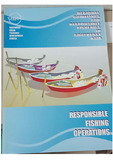Regional guidelines for responsible fisheries in Southeast Asia: Responsible fishing operations
抄録
The Code of Conduct for Responsible Fisheries was adopted at the FAO Conference in 1995 after four years of effort exerted by most of the countries that have a genuine interest in fisheries. This was a positive sign in the countries of the world that had committed their efforts to reconcile the unregulated fisheries practices with their grave concern on the current status of fisheries resources. It can be said that this new era of fisheries is harmonizing its development with the given aquatic environment to assure a sustainable status. All member countries of FAO are requested to implement the required commitment and actions under the framework of the internationally agreed Code of Conduct for Responsible Fisheries.
Citation
Southeast Asian Fisheries Development Center. (2000). Regional guidelines for responsible fisheries in Southeast Asia: Responsible fishing operations.
主題
Collections
Related items
Showing items related by title, author, creator and subject.
-
Status of Fishing Condition in Indonesia in Relation to Responsible Fishing
Widana, Ketut (Training Department, Southeast Asian Fisheries Development Center, 1997)The paper documents the status of fishing industry in Indonesia. Government policies on responsible fishing were given emphasis. Moreover, manpower distribution, fish production and export, and some aspects of the ... -
Fisheries Management Policy in Malaysia: Issues on Responsible Fishing
Yassin, Abdul Hamid Bin (Training Department, Southeast Asian Fisheries Development Center, 1997)The legal and institutional policies on the management of the marine fisheries industry in Malaysia are presented in the paper. Specifically, management issues and problems that affect the industry, such as, overfishing, ... -
Status of Fishing Conditions in Japan in Relation to Responsible Fisheries
Inoue, Yoshihiro; Chopin, Frank (Training Department, Southeast Asian Fisheries Development Center, 1997)The presence of a large number of species that are low in quantity in Japan's coastal waters has resulted in the evolution of a food culture that has historically utilized most of the catch species and sizes that are caught ...




